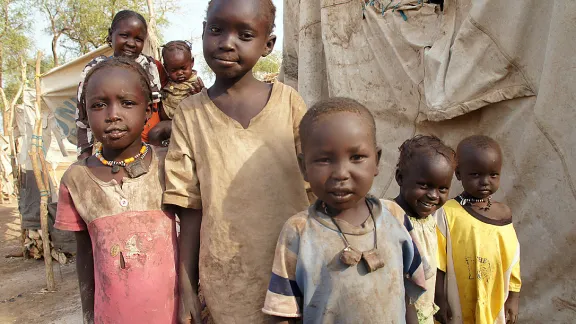
Children from Kordofan in Gendrassa refugee camp, South Sudan. The ongoing conflict in the latest UN member state provides an especially difficult working environment. Photo: LWF/ C. Kästner
Call to protect humanitarian space
GENEVA, 2 July 2015 (LWI) – The Council of the Lutheran World Federation (LWF) has issued a public statement on protracted conflicts and the over-stretched humanitarian response, drawing attention to the high number of 60 million displaced people worldwide and the fact that more than half of them are children.
“The world’s humanitarian responders are over-stretched and unable to properly respond to the needs of those affected by these violent conflicts. The scale of suffering and the necessary response is overwhelming the system,” the statement reads.
Currently, the LWF World Service works in 32 countries. It is responding to emergencies and protracted humanitarian situations. LWF World Service assists people fleeing violence in Syria, South Sudan, Sudan, Somalia, Iraq, Central African Republic, Mali, DR Congo, Burundi, Myanmar, Colombia, and Central America.
Some refugees have fled for a second or third time. Others have spent years in a refugee camp. One example is Daniel Deba, a biology professor from the Central African Republic who was threatened and fled to Chad with his family ten years ago. His children have grown up in Dosseye refugee camp, where the LWF is offering training, food, relief items, psycho-social care and livelihood support. The family does not know when it will be safe to return, or if they will be offered resettlement to another country. “Of course I want to go home,” he says, “but that is not possible.”
With 15 new conflicts erupting in 2014 alone, the protracted crisis in the Central African Republic (CAR) receives less international attention. It is no longer considered one of the most severe emergencies by the UN, however the UN notes that the humanitarian situation is as dire as ever. CAR is but one example. The number of refugees in countries like Kenya, Ethiopia, Jordan, Chad and Uganda increases every year.
At the same time, the working environment for humanitarian staff becomes more challenging. In 2014, LWF World Service staff experienced security incidents in South Sudan, CAR, Chad and Myanmar. Continued fighting prevents the transport of relief goods to those in need and raises operation costs.
The LWF public statement calls upon the United Nations Security Council to “suspend the veto power by the permanent five members in matters related to preventing or ending genocide, war crimes or crimes against humanity”. It urges parties to the conflict “facilitate humanitarian access” and to “protect and promote the safety, space and freedom of humanitarian personnel” to work without political pressure.
The statement calls upon LWF member churches to welcome refugees and to support member churches and Christians under persecution.


